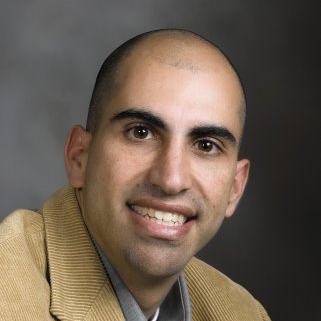News
Salaita lashes out at Zionist money for destroying his career
Palestinian-American scholar Dr Steven Salaita is still furious about the fact that his offer of a professorship at the University of Illinois was revoked in 2014 after he put out a series of anti-Israel tweets.

MOIRA SCHNEIDER
He now drives a bus for a living.
Last Wednesday, Salaita blamed Israel-supporting donors for destroying his career. He claimed that academic freedom was always conditional on corresponding politics, and was not possible in institutions possessed of wealthy donors.
This was while delivering the 53rd annual TB Davie Memorial Lecture at the University of Cape Town (UCT), held under the auspices of its Academic Freedom Committee.
Salaita, speaking to a slightly more than half full auditorium of about 120 people on “The Inhumanity of Academic Freedom”, recounted his experience of having his professorship in American Indian Studies revoked.
Although he said a court settlement had been reached in his favour, he hasn’t been able to secure another position in academia. He referred to this as “a rigorously enforced blacklist”, and claimed that numerous bodies had labelled his firing as “a clear-cut violation” of academic freedom, but to no avail.
“For five years, I’ve had to consider whether my sharp criticism of Israel and subsequent recalcitrance – the unwillingness to grovel my way back into academe’s good graces – was worth it. I wouldn’t change anything, nor do I entertain regret,” he stated defiantly.
“They took my career. They continue to patrol academe to make sure I never return. That’s why they’re complaining about my presence at UCT. They’re sending a message: ‘Don’t even dream of hiring this guy; don’t even consider it.’”
Salaita went on to claim that it was Israel or the Jewish lobby and its “donations” that was enforcing the demise of his academic career. “We’ll create a circus, a ragbag of bad press, the one thing that administrators of all ideological leanings dread. We’ll withhold donations. We’re willing to harm the entire institution in order to preserve our anachronistic politics. I know this because they do the same thing at every campus I’ve ever visited.”
Salaita claimed that anti-Zionism wasn’t racism, but “the just position”, and that more than anything, denouncing Israeli aggression had a long record of provoking recrimination.
He maintained that Israel was the subject of endowed professorships across the globe. “Why does this comparatively miniscule country, in both size and population, enjoy such prominence on campus?” he asked. “The obvious answer is that the state’s supporters spend money on professorships.
“This explanation isn’t comprehensive, though. Lots of factors exist: the importance of Israel to US culture and identity; Israel’s prominent role in Western imperialism; the pro-Israel leanings of many professors and administrators; the state’s seamless reproduction of orthodoxy; the notion that Israel is exceptional and thus worthy of special analysis; methodical efforts to scrub Palestinians from the globe.
“Zionists have made it so that even identifying as Palestinian is contentious. In spaces devoted to learning, inquiry into our very existence is verboten [forbidden].”
Salaita went on to paint US President Donald Trump with his tainted brush, saying that upon becoming president of the US, he appointed “Likudnik” Kenneth Marcus as head of the office for civil rights at the department of education. Marcus founded the Louis D. Brandeis Center for Human Rights, which had “dragged dozens of pro-Palestine activists into court – including myself”.
He continued his tirade. “To this day, not a single university president has condemned the University of Illinois’s 2014 annihilation of academic freedom or its destruction of the programme in American Indian studies.”
He described Zionists’ argument about campus being awash in anti-Israel (“and thus anti-Semitic”) sentiment as “a fantasy, or, more precisely, a rhetorical gimmick to convey a more critical point that challenging their supremacy is a form of prejudice.
“Once a narrative about an academic’s offensive social-media profile takes hold, it becomes a permanent demerit. Because I was marked in a particular way, deliberately and publicly, I can’t visit Palestine, my mother’s ancestral land, as the Zionist occupiers control all ports of entry.
“I can’t find a single university president who will affirm my right to extramural speech. I can’t get an office job with any campus or corporation that has access to Google.
“I’ve been sued two different times by the same people who wrecked my academic career. Tell me, then, what opportunity? What autonomy? What freedom?
“Academic freedom can’t make any university hire me, no matter how strong my CV. It can’t alleviate the fear administrators have of upsetting the Israel lobby.”
With this in mind, he tackled the UCT senate’s resolution in March to end collaboration with Israeli academic institutions operating in the occupied territories. Salaita referred to it as having “set off a flurry of disapproving and often reproachful commentary from Zionist scholars. Most of them, not wanting to betray partisan motivation, disapproved of the resolution by citing academic freedom.
“First of all, the decision was made according to a democratic governing process, so it represented a classic example of academic freedom in action. What, then, are critics of the resolution actually doing?
“What do they truly want, beyond piety and platitudes? They’re asking upper administrators or outside forces to intervene in faculty governance based on political displeasure, the very thing academic freedom is supposed to prevent.”
Asked what inspired him to remain calm in the face of his challenges, Salaita said, “People think I’m a monster because of my Twitter comments. I’m not. It’s part of my social media persona.”